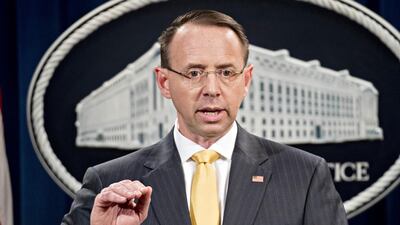The White House and Donald Trump offered their first, careful admissions that Russian agents meddled in the 2016 election hours after the man leading the Russia investigation unveiled a broad indictment detailing the shocking extent of Moscow's efforts to swing the vote.
For months the president has dismissed the allegations as a “hoax” and his allies attacked the investigation as a bid to undermine his surprise win.
But on Saturday, HR McMaster, the White House national security adviser, said: “As you can see with the FBI indictment, the evidence is now really incontrovertible and available in the public domain” that Russia had used cyber-meddling to interfere in the election.
He was speaking at the Munich Security Conference hours after Mr Trump also appeared to concede the allegations were true.
Analysts said there was little prospect the 37-page indictment would lead to prosecutions. Instead they said Robert Mueller, the special counsel leading the investigation, had delivered a narrative of Russian interference that would shock the American public and make it harder for Republicans to write off his inquiries as a witch hunt.
The document offers stunning new detail about how 13 Russian agents stole the identities of American citizens to pose as political activists and post inflammatory messages about hot-button topics such as race and immigration to manipulate the campaign.
They swamped social media with disinformation and organised rallies with the “strategic goal to sow discord in the US political system”.
So convincing were their efforts that some of the Russians were also in touch with “unwitting individuals associated with the Trump campaign”.
However, Mr Mueller stopped short of concluding there had been any collusion with the Trump team.
Those indicted include a businessman nicknamed "Putin’s chef" who is accused of bankrolling a “troll farm” in St Petersburg, an IT expert who used computer servers to disguise the farm’s location, and a female spy who entered the US in 2014 to gather intelligence.
Mr Trump, after months of dismissing the investigation as fake news, offered his most direct acknowledgement that Russia had meddled in the election.
“Russia started their anti-US campaign in 2014, long before I announced that I would run for President,” he wrote on Twitter. “The results of the election were not impacted. The Trump campaign did nothing wrong — no collusion!”
For their part, Russian officials shrugged off the allegations or treated them with scorn.
Sergey Lavrov, the Russian foreign minister, said he had no response.
“Until we see the facts, everything else is just blabber — I’m sorry for this expression,” he said at the Munich conference.
One of the figures named in the indictment is Yevgeny Prigozhin, a wealthy businessman with ties to President Vladimir Putin. He earned his nickname as “Putin’s chef” for his restaurants and school meals production facilities.
According to the indictment, he funded the Internet Research Agency, a St Petersburg-based group that has been denounced as a “troll farm” and accused of using social media and adverts to sway the election.
“Americans are very impressionable people; they see what they want to see,” he was quoted as saying by the Russian state news agency RIA-Novosti. “I treat them with great respect. I’m not at all upset that I'm on this list. If they want to see the devil, let them see him.”
The suspects worked to promote information harmful to Hillary Clinton, while promoting Bernie Sanders, her Democratic rival, and Mr Trump.
They allegedly tried to dissuade minority voters — a key Clinton demographic — from turning out. For example, they ran an Instagram account named “Woke Blacks” to portray African-Americans who supported Mrs Clinton as wrong-headed.
The effort was known as Project Lakhta and by September 2016 it had a monthly budget of $1.2 million (Dh4.4m), according to the indictment.
Jeanne Zaino, professor of political science at Iona College, said the indictment read more like a “blockbuster spy novel” than a document written by lawyers.
Its real purpose, she said, was to convince the American public that Russia had committed something amounting to an “act of war” that needed to be taken seriously.
“These 13 people are never going to appear in court, Russia’s never going to turn them over, we’re not going to go in and get them,” she said. “So what is this?
“It’s a narrative laid out for the public and the administration to say this is why we need to take this seriously. This is what Russia did, and why all the president’s defence of Russia — during the campaign and up till now — flies in the face of reality.”
The details were seized upon by Mr Trump’s critics, who said it showed he could no longer dismiss the investigation or threaten to fire Mr Mueller.
Tom Perez, chairman of the Democratic National Committee, said the president’s denial of the facts about the Russia investigation had posed a threat to American democracy.
“This investigation has grave implications for the integrity of our democracy,” he said. “Donald Trump and his Republican enablers’ efforts to discredit it only embolden Russia and makes them all accomplices to future attacks on our elections.”
_______________
Read more:
‘Putin’s chef’ among 13 Russians named in US election meddling probe
Memo controversy shows how the Republican Party is bending to Donald Trump
Trump accuses justice officials of politicising Russia investigation
_______________

